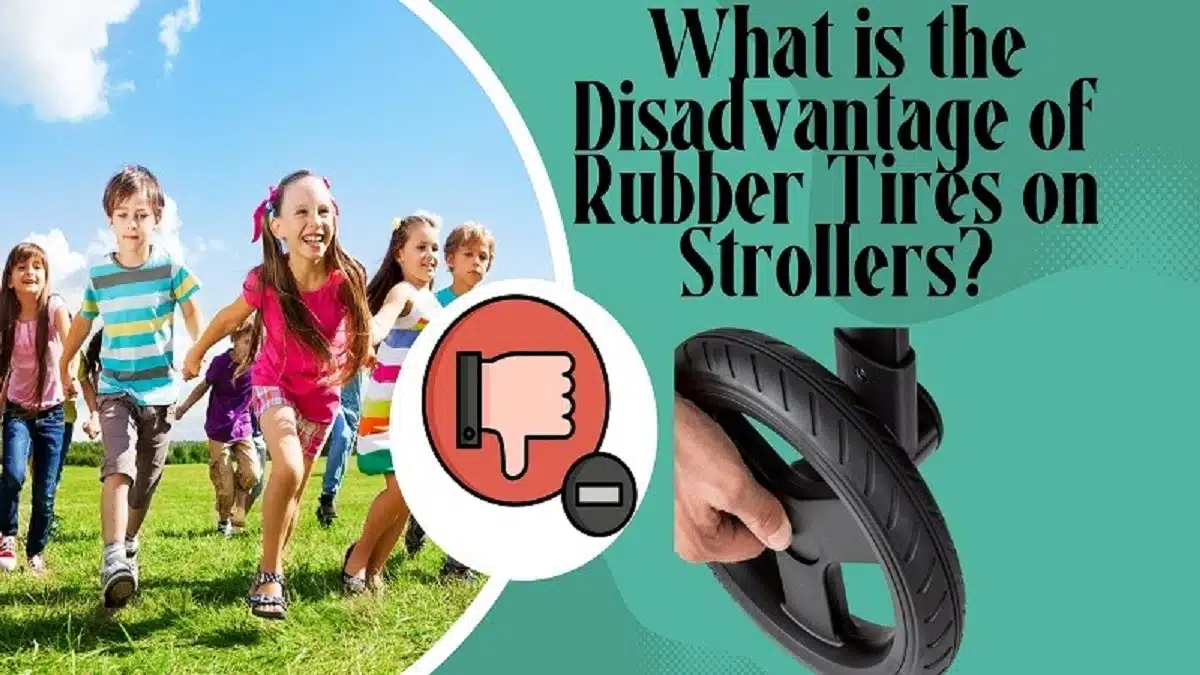Strollers are an essential tool for parents to transport their babies conveniently.
They come in various types and designs to cater to different needs, including strollers with rubber tires.
While rubber tires may have advantages, they also come with disadvantages that can affect the overall performance and usability of the stroller.
In this article, our main topic of discussion is What is the Disadvantage of Rubber Tires on Strollers?
Importance of Rubber Tires on Strollers
Rubber tires on strollers are known for providing a smooth and comfortable ride for the baby.
They offer excellent shock absorption, reducing the impact of bumps and uneven terrains.
Rubber tires also provide good traction, allowing the stroller to grip the ground firmly and maneuver easily.
Moreover, rubber tires are durable and resistant to wear and tear, making them suitable for long-term use.
Disadvantages of Rubber Tires on Strollers
Despite the advantages, rubber tires on strollers also have disadvantages that may affect their usability in certain situations.
Limited Durability
One of the disadvantages of rubber tires on strollers is their limited durability. Rubber tires can wear out over time, especially when used on rough terrains frequently.
The constant exposure to uneven surfaces, gravel, and debris can cause the rubber to degrade, resulting in a shorter lifespan compared to other types of tires.
This can lead to additional costs for replacement tires, which can be inconvenient for parents on a budget.
Difficulty in Maneuverability
Another disadvantage of rubber tires on strollers is that they can be challenging to maneuver in tight spaces.
Rubber tires are usually larger and bulkier than stroller tires, such as plastic or foam-filled ones.
This can make it difficult to navigate through narrow doorways, crowded areas, or tight corners, which can be frustrating for parents trying to maneuver the stroller in busy environments.
Rough Ride for the Baby
Rubber tires, especially solid rubber tires, may not provide the smoothest ride for the baby.
While they offer good shock absorption on rough terrains, they may be less comfortable on smoother surfaces like pavement or indoor floors.
The rigid nature of rubber tires can transmit more vibrations and jolts to the stroller, disturbing the baby’s comfort and sleep.
Maintenance and Replacement
Maintaining rubber tires on strollers can also be more cumbersome than other tires.
Rubber tires may require regular cleaning and inspection to ensure they are free from debris and wear.
Additionally, if the tires wear out or get damaged, they may need to be replaced, which can add to the overall cost of the stroller.
Unsuitability for Different Terrains
Rubber tires may not be suitable for all terrains.
While they perform well on flat surfaces and moderately uneven terrains, they may struggle on more challenging terrains, such as sandy or muddy paths, rocky trails, or snowy surfaces.
Rubber tires may lack the necessary traction or grip to navigate such terrains, limiting the stroller’s usability in specific outdoor environments.
Alternatives to Rubber Tires
Suppose the disadvantages of rubber tires on strollers are a concern. In that case, parents can consider alternatives available in the market.
Some of these alternatives include:
Air-Filled Tires
Air-filled tires, also known as pneumatic tires, are made of rubber but are filled with air, similar to car tires.
These tires provide excellent shock absorption and maneuverability, making them suitable for various terrains.
They offer a smooth ride for the baby and can easily handle rough terrains.
However, they may require regular maintenance, such as checking and adjusting the air pressure, and can be prone to punctures.
Foam-Filled Tires
Foam-filled tires are made of rubber but with foam instead of air. These tires offer similar benefits to air-filled tires regarding shock absorption and maneuverability.
They provide a smooth ride for the baby, are puncture-resistant, and do not require regular maintenance like air-filled tires.
However, air-filled tires may be less comfortable on highly rough terrains.
Solid Rubber Tires
Solid rubber tires are made of solid rubber material and do not require any inflation or foam filling. These tires are puncture-proof, durable, and low maintenance.
They are suitable for smooth surfaces and moderate terrains but may provide a different level of shock absorption and comfort than air-filled or foam-filled tires.
They can be a good option for parents prioritizing durability and low maintenance.
Conclusion – What is the Disadvantage of Rubber Tires on Strollers?
While rubber tires on strollers have advantages in providing a smooth and comfortable ride for the baby, they also come with disadvantages.
These include limited durability, difficulty in maneuverability, potential discomfort for the baby, higher maintenance and replacement costs, and unsuitability for different terrains.
Parents need to consider these disadvantages when choosing a stroller with rubber tires and assess their needs and preferences accordingly.
FAQs (Frequently Asked Questions) – What is the Disadvantage of Rubber Tires on Strollers?
Are rubber tires the only option for strollers?
No, there are alternatives to rubber tires available for strollers, such as air-filled tires, foam-filled tires, and solid rubber tires.
Are rubber tires suitable for all terrains?
Rubber tires perform well on flat surfaces and moderately uneven terrains but may not be suitable for challenging terrains such as sandy or muddy paths, rocky trails, or snowy surfaces.
Do rubber tires require regular maintenance?
Rubber tires may require regular cleaning and inspection to ensure they are free from debris and wear. They may also need replacement if they wear out or get damaged.
Can rubber tires be replaced?
Yes, rubber tires can be replaced, but it may add to the overall cost of the stroller.
What are the advantages of air-filled tires over rubber tires?
Air-filled tires offer excellent shock absorption and maneuverability and provide a smoother ride on rough terrains than rubber tires.

